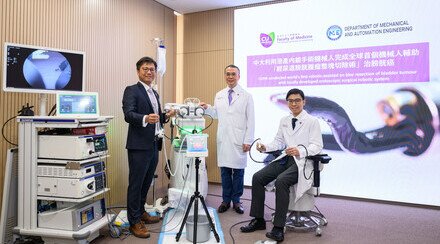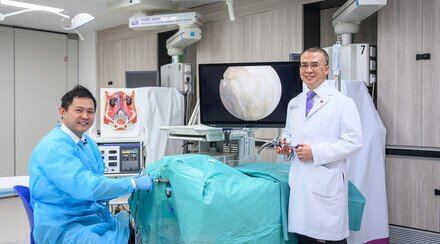CUHK's Youth Urological Treatment Centre Opens Today Territory's First Centre to Provide Urological Assessment and Treatment to Young Drug Abusers
Funded by the Beat Drugs Fund of the Hong Kong SAR Government and established by the Department of Surgery at The Chinese University of Hong Kong (CUHK), the Youth Urological Treatment Centre (YUTC) held its opening ceremony today (19 March) at the Prince of Wales Hospital. YUTC is the first-of-its-kind in Hong Kong, providing urological assessment and treatment specifically to youths suffering from urinary tract dysfunction as a result of psychotropic substance abuse. Officiating guests of the opening ceremony included Ms. Pong Oi-lan Scarlett, JP, Chairman, Preventive Education and Publicity Sub-committee, Action Committee Against Narcotics, Hong Kong SAR Government; Dr. Fung Hong, JP, Cluster Chief Executive, New Territories East Cluster, Hospital Authority; Prof. Lai Bo-san Paul, Chairman, Department of Surgery, CUHK; Dr. Man Chi-yin, Hospital Chief Executive, North District Hospital; Dr. Lau Mun-cheung Herman, Hospital Chief Executive, Cheshire Home Shatin; Ms. Ho Pui-yee Becky, Deputizing Cluster General Manager (Nursing), New Territories East Cluster, Hospital Authority; Prof. Ng Chi-fai Anthony, Professor, Division of Urology, Department of Surgery, CUHK; and Dr. Tam Yuk-him, Consultant, Division of Paediatric Surgery and Paediatric Urology, Department of Surgery, Prince of Wales Hospital.

(from left) Dr. TAM Yuk-him, Consultant, Division of Paediatric Surgery and Paediatric Urology, Department of Surgery, Prince of Wales Hospital; Dr. LAU Mun-cheung Herman, Hospital Chief Executive, Cheshire Home; Prof. LAI Bo-san Paul, Chairman, Department of Surgery, CUHK; Dr. FUNG Hong, JP, Cluster Chief Executive, New Territories East Cluster, Hospital Authority; Ms. PONG Oi-lan Scarlett, JP, Chairman, Preventive Education & Publicity Sub-committee, Action Committee Against Narcotics, HKSAR Government; Dr. MAN Chi-yin, Hospital Chief Executive, North District Hospital; Ms. HO Pui-yee Becky, Deputizing Cluster General Manager (Nursing), New Territories East Cluster, Hospital Authority and Prof. NG Chi-fai Anthony, Professor, Division of Urology, Department of Surgery, CUHK officiate at the ribbon-cutting ceremony of CUHK's Youth Urological Treatment Centre, marking the opening of the territory's first centre to provide urological assessment and treatment to young drug abusers.
YUTC is jointly run by paediatric and adult urologists of CUHK Department of Surgery with the full support from the hospital management of the New Territories East Cluster. It commenced its services in December last year, providing 2-3 clinical sessions in the setting of day-care service of Hospital Authority to young substance abusers under the age of 30 who suffer from urinary tract symptoms.
Dr. Tam Yuk-him, Director of YUTC, explained that psychotropic substance abuse will lead to chronic inflammation in urinary bladder, with symptoms including increased urinary frequency, urgency, painful urination and lower abdominal pain. The longer the duration of the abuse, the higher the chance to suffer permanent damage to the urinary bladder resulting in permanent loss of its storage and continence function, with kidney damage and renal failure as the most serious consequences. 'Once the urinary bladder has been permanently damaged, its function cannot be fully restored even the abuser quit drugs. The key to minimizing permanent damage to urinary bladder is to stop substance abuse immediately and to receive early urological assessment and treatment,' said Dr. Tam. YUTC offers a telephone hotline for fast-track appointment booking without the need of referrals by clinicians. Young patients or their social workers can simply call the hotline to make appointments across the territory. 'Proper counseling and treatment to young patients at their early stage of urological symptoms will not only effectively reduce their physical sufferings, but in the long run may also reduce the financial burden on the healthcare system incurred by morbidity in urinary tract as a result of prolonged substance abuse and delay in urological treatment,' Dr. Tam added.

Prof. NG Chi-fai Anthony, Professor, Division of Urology, Department of Surgery, CUHK shows the officiating guests the one-stop services of the Youth Urological Treatment Centre (YCTU). The Centre will provide the young drug abusers with the least invasive investigation including urine analysis, blood tests, uroflowmetry and bladder scan, in addition to the standard clinical assessment.
Prof. Ng Chi-fai, the Co-director of YUTC, presented the clinical data of the 41 patients who have consulted YUTC over the last 3 months. Majority of the patients were accompanied by their social workers; two thirds were female aged 16 to 28 years who had abused psychotropic substance for 3 months to 12 years. Ketamine was the predominant substance being abused. Half of the patients had abused more than one substance. The duration of urinary symptoms prior to their first consultation at YUTC ranged from 1 month to 10 years. Majority of the patients experienced severe urinary frequency and some even woke up for over 10 times per night for urination. 'Some patients had strong urge or full bladder sensation while their urinary bladder was only filled with not more than one tenth of the normal capacity of an adult,' said Prof. Ng. YUTC provides one-stop urological assessment and treatment to patients upon their first consultation by performing the least invasive investigations including urine analysis, blood tests, uroflowmetry and bladder scan, in addition to the standard clinical assessment.
The paediatric and adult urology teams of the Department of Surgery at CUHK are dedicated to raising public awareness on the detrimental effect of psychotropic substance abuse on urinary tracts among young abusers. YUTC encourages youth abusers to seek early medical consultation through its fast-track hotline services and to quit drugs early as the ultimate solution.
CUHK's Youth Urological Treatment Centre Telephone Hotline:3505 3773
(Every Monday to Friday 9:00 am to 5:00 pm, and voice message recording service is available after the service hours)














































